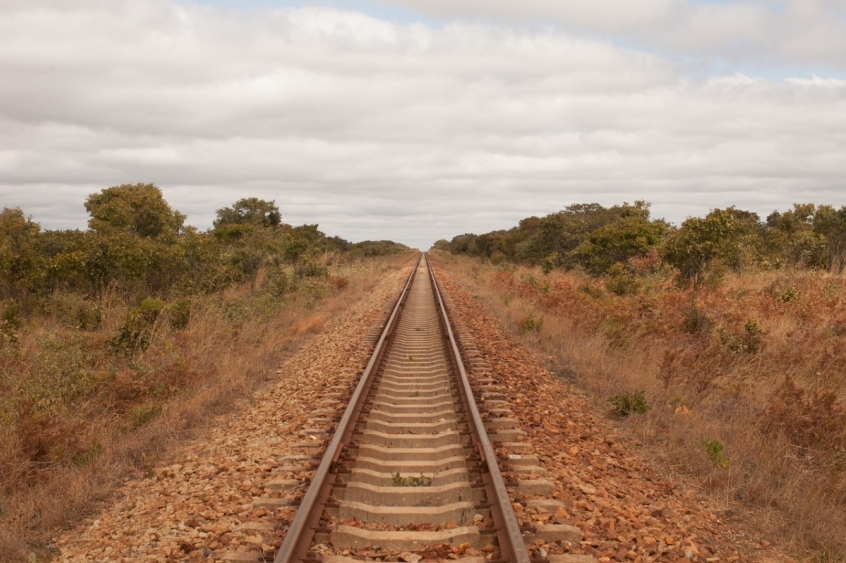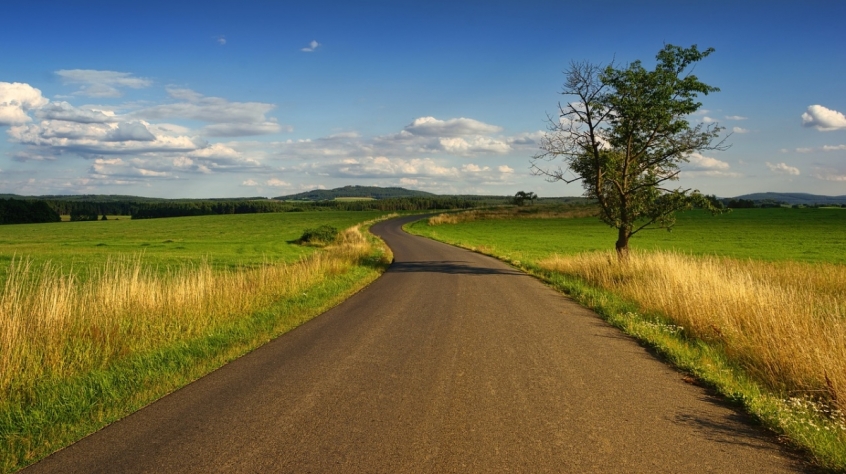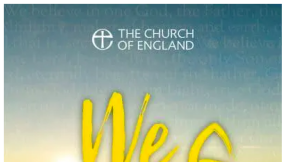Life, as they say, is a journey. Not a consistent one, granted: for some, very long; for others, tragically short. Sometimes smooth, mostly uneven, frequently off-piste – but a journey nonetheless. For me, my favourite journey of all time was by train from Dar-es-Salaam deep into Western Tanzania, to a town called Tabora.
There's no better way to see the world than by train. In a car you see motorway embankments and blue signs; on a train you see the world. And we certainly saw Tanzania. The train never exceeded 30mph, it stopped in unexpected locations for up to 45 minutes at a time, at which point a market would 'suddenly' materialise and locals would sell you trinkets and bracelets and, if you were really lucky, a live chicken. It was chaotic, vibrant, slightly unnerving and incredibly beautiful.

Much like life, in fact. That train journey in many ways felt like a living illustration of my life. I know vaguely where I'm going, at least theoretically, but have no idea of the stops along the way, or when they will happen, or how long it will take to get to each one. I've no idea what will happen every time life stops, what 'market' will appear, who I will meet and what I will come away with.
And in fact, to put it in Christian terms, although I know the name of the end destination – that would be Heaven – what it will be like remains a mystery, a series of fleeting images lodged deep in my imagination. Like the train to Tabora, I know I'll get there, but how, or when is beyond my comprehension.
So life is indeed a journey. But it's not only a journey, is it? Life has moments, seasons, points of radical change. Psychologists and counsellors talk about 'liminal' moments. The word liminal comes from the Latin 'limen' which literally means a doorframe or doorway, and by extension a threshold. So a liminal moment is a threshold into something new: a new job or home, getting married, or, more tragically, bereavement. Each such threshold leads us into a new place: much of our life may remain the same, but there is also the sense that something has changed forever.
I have had many 'typical' liminal moments in my life: getting married, having my first child, the death of my much-loved mother. But liminal moments are not always what you expect. I remember as a teenager getting mugged – three times in fact, the last being when I was 17 – and effect was traumatic. I was afraid to leave the house for a year. I felt weak, vulnerable, easy prey for a society full of wicked people. Of course I still had to go to school, to the library, to the shops, but every journey was some sort of small victory over the fear and nausea within.
Then one day, 18 months later, everything changed. It was as much a surprise to me as to anyone. I was reading my Bible in bed one morning, Philippians chapter 1 as it happens. And this verse literally leapt off the page at me: 'For to me, to live is Christ and to die is gain.' Paul was in prison at the time, his life was constantly in danger, but his perspective was so radically different to mine. I'll just go for it, he says, since even if the worst should happen and I'm killed, well that's actually the best thing that could happen, as I'll be with God in glory. To live is Christ, and to die is gain.
My attitude to life changed that day. I knew that God was calling me to let go of my fear, to trust him and to go for it, to seize life every day and trust God for the rest.
It was a liminal moment, a major threshold in my life. Not that everything was plain sailing after that, or even that I suddenly became fearless – but God had spoken directly to me through a special verse in Scripture, and set my life on a new trajectory. A year later I started doing outreach youth work with the sort of kids who had mugged me. That's what it means for God to 'heal the past'.
God has a habit of doing things like that. And he does it because he is a God of the moment, the season, the encounter, and not just the journey.
Introducing kairos...
Nowhere is this idea more obvious than in the life of Jesus. Indeed, we know that the idea of the moment, the season, the encounter is important to God because of the way he lived when he was with us on earth. Moments and seasons are central to the mission and ministry of Jesus. He begins his public ministry with this famous pronouncement (Mark 1:15): 'The time has come. The kingdom of God is near. Repent and believe the good news!'
The word for 'time' here is very important: it's kairos, and it means a season, or a specific moment. In other words: the specific moment has arrived, the season of waiting has been completed... it's time! Time for the new thing that God is doing, time to recognise that God is near, time to respond to the good news in repentance and faith.
Kairos time always has a sense of significance about it. It's time for something. It is a moment with meaning.
But it is not necessarily a short moment. Kairos time can be a season, a significant period, even a lengthy one. If you look at the events in Jesus' life immediately before he made that great pronouncement, he experienced two profound examples of the kairos moment. In the first, he was baptised and filled with the Spirit (Mark 1:9-11). The impression is of something that was hugely important, but there were huge crowds being baptised, so it couldn't have lasted more than a short moment. However, then he was sent by the Spirit into the desert, where he fasted 40 days and was tested by the devil. This is another kairos episode, it was God's way of preparing him for what lay ahead, and he returned from this ready to begin his public ministry: but it was more of a season than a moment.
...but not forgetting hodos
But – and by now you'll be expecting this – Jesus understood that life was also more than just a series of kairos moments. It was a journey.
God does journeys. He called Abraham from Ur and made him travel hundreds of miles to Canaan. He called Moses in Egypt and made him lead his people hundreds of miles out of slavery and into the desert, eventually arriving at the Promised Land. He called his people out of exile in Babylon and made them travel – you guessed it again – hundreds of miles back to Israel. He called Joseph and Mary and made them travel 90 miles to Bethlehem, and then – just as you were thinking the symmetry was lost – hundreds of miles into Egypt... and hundreds of miles back again.

Journeys figure prominently throughout the Bible. But it's not just about physical journeys. The idea of the way, the spiritual journey, is central to Jesus life and thinking too. It's a little word – hodos – which appears 89 times in the New Testament. John the Baptist, Jesus' cousin, was sent to prepare the way (hodos) for the Messiah. When Jesus set out for Jerusalem, he is described as being on the way, the journey, the hodos to Jerusalem. In fact, if you trace Jesus' journey as Luke describes it – and Luke actually calls it his 'exodus', just like the early Israelites (Luke 9:31) – you'll see that journey took him all over Israel: starting in the far north of the country, across the Jordan, out into the desert, through Samaria, eventually arriving in Jerusalem. It must have taken weeks, at least.
Most significantly of all, the idea of the hodos, the way, was central to Jesus' own identity. When his disciples asked him the way to God, Jesus said that he himself was the way, the hodos (John 14:6).
So when the first Christians described themselves as Followers of the Way (Acts 9:2), they weren't declaring their obedience to a philosophy or set of teachings, but rather to a person, The Way. Similarly, even now as Christians we don't just journey to God with Jesus, we journey in him and through him. Jesus is our way, our journey.
The balancing act
So living life Jesus-style is about both season and journey: the moment and the marathon. It commits to the long haul and the dramatic encounter.
The trouble is, most of us tend to prefer one or the other. So do most churches.
Churches which emphasise the importance of the moment tend to be full of people – since people are regularly challenged to come to faith, and meet God in very powerful ways each week – but might lack depth. They find it difficult to support people with chronic pastoral needs or illnesses because they have no theology of journey, nothing to say if the moment doesn't produce the expected transformation or change. They prioritise passion and courage but can neglect the ancient disciplines of study, prayer and silence. They tend to like the latest Christian fad, since fads tend to promise new experiences, new 'kairos' moments.
On the other hand, churches which tend only to preach the importance of journey often develop deep communities of committed, pastorally-minded people, who look after each other and have a real depth to their lives... but they might struggle to get people through the doors, simply because they are afraid to challenge people.
We can't assume that all people somehow find their own way to God. Mission and evangelism require a certain amount of 'kairos', most people do not just wake up one morning and realise they are Christians (although some do). A kairos moment is a challenge moment, a decision moment, it might be good or bad but it usually leads to change. And what stifles mission also stifles discipleship. Getting too comfortable with 'journey' can sometimes just suck the life out of you. What is God doing now? That is a question such churches need to start asking, both for themselves as a church, but also for individuals. In short, people need a bit of kairos in their lives.
Seeking the season, living the journey
So this kairos and journey thing is not as easy as it sounds. Embracing both will almost certainly challenge our prior experience, our church culture and probably our natural personal preference.
But it is the path to real maturity, to developing a faith which is both resilient and responsive, which sees what God is doing without jumping thoughtlessly on the back of every latest fad.
So how do we develop a life that embraces both? That's the subject of the next article.... or to put it another way, you'll get the kairos moment eventually, but not without a short journey. But in the meantime, ask yourself two questions this week: how am I journeying at present? And what kairos is there in my life?
Rev Matt Trendall is Rector of Walton Churches Partnership, Milton Keynes.













